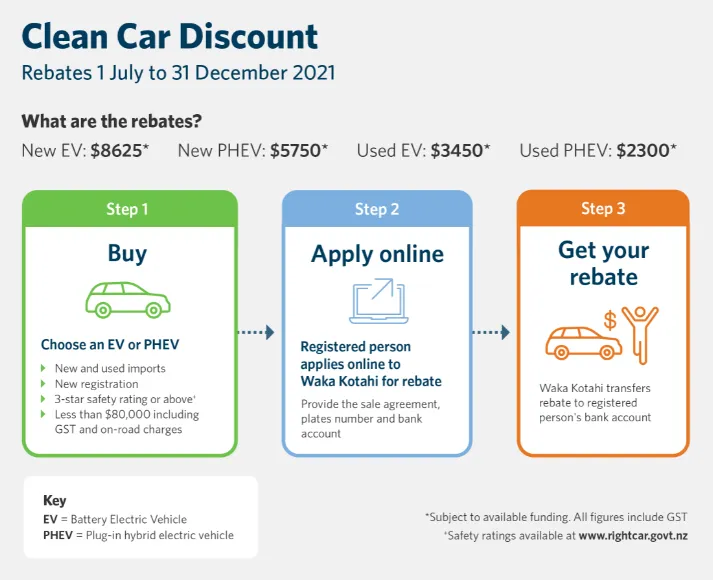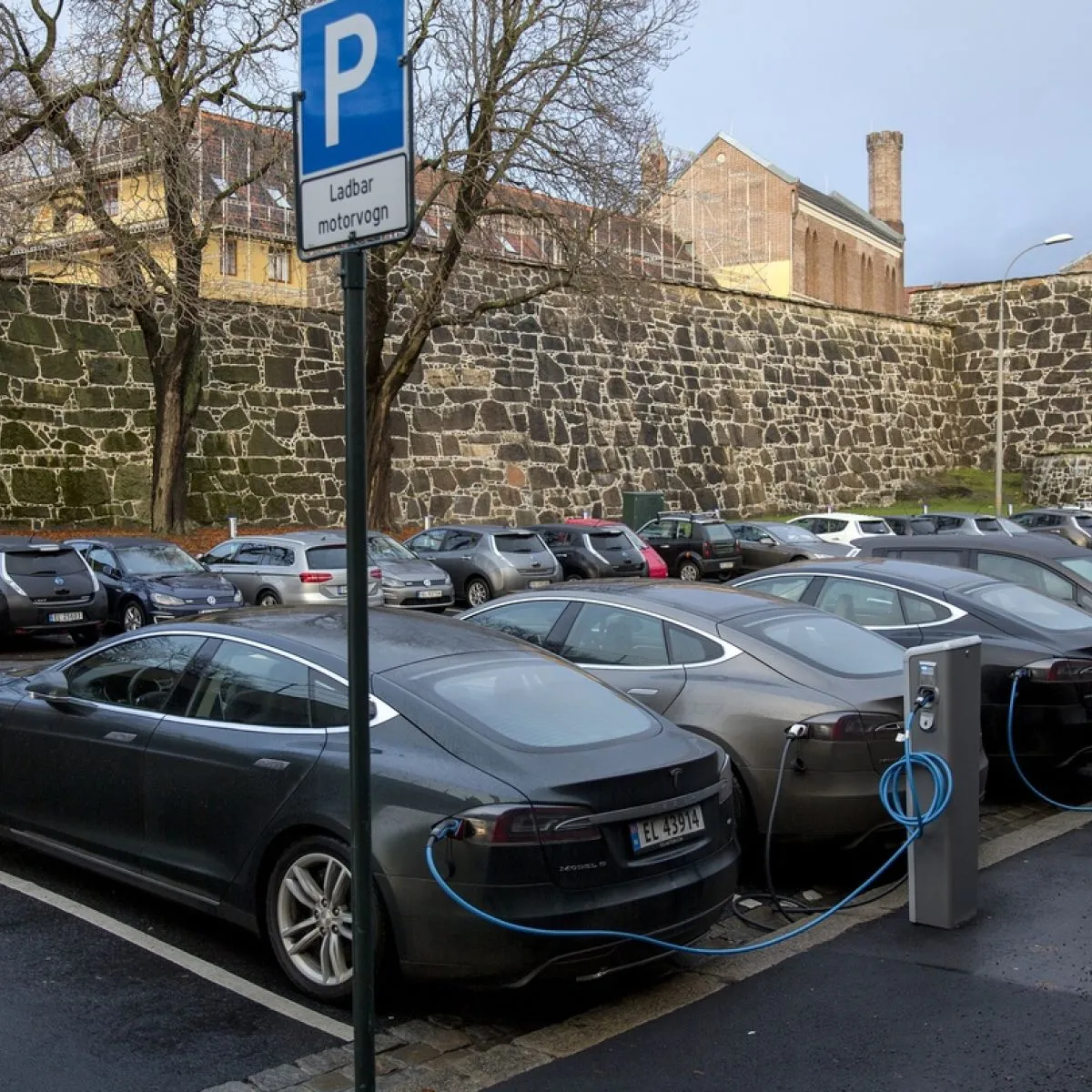Electric vehicle subsidies
Craig Shearer - 21st June 2021
Last weekend saw the release of a new policy by the government called the Clean Car Discount.
The scheme provides a rebate, starting on the 1st July, for purchasers of low emissions vehicles (Battery EVs - zero emission, and Plug-in Hybrid EVs or PHEVs which are classed as low emission). The rebates range from $8,625 for a new EV down to $2,300 for a used PHEV. They cover only vehicles registered for the first time in New Zealand, meaning that they don’t apply to second-hard sales of already-registered vehicles.
And, from the beginning of next year, purchasers of new and newly-registered used cars that are considered high emissions will be required to pay an additional fee of up to $5,175.

The scheme is designed to bias the market for new vehicles in favour of those that produce much less CO2 emissions. The transport sector makes up a huge chunk of NZ’s CO2 emissions - around 47% as of 2018. If we’re to meet our target of being carbon neutral by 2050 we need to be moving towards de-carbonising the fleet as urgently as possible.
As much as many people want to help out with reducing CO2 emissions by switching to an EV, the vehicles are still a lot more expensive than their fossil-fuel counterparts. We still have a way to go with improving battery technology and reducing its cost. So the subsidy will help those for whom the current cost of an EV is out of reach. It will have the secondary effect of putting more EVs into the market so that in future years there is a bigger second-hard market
As with any change in government policy there are going to be winners and losers. And, typically there’s plenty of misinformation around that feeds into people’s emotions. I’d like to cover off a few of these.
Firstly, I’m an EV owner and have been for nearly four years. I switched to a Nissan Leaf back in 2017, and earlier this year upgraded to a Tesla Model 3. I must say I’d find it very hard to go back to owning an internal combustion engine-based vehicle (ICE as they’re known in the EV community).
I’m probably going to sound like a fanboi, but there are so many advantages to EVs:
-
They’re incredibly cheap to run, especially if you do most of your charging at home, and take advantage of low night rates. (My plan costs me 12 cents per kWh between 9pm and 7am). The comparison to an ICE vehicle is that it’s equivalent to paying 40 cents per litre of petrol. Additionally, I spend virtually no time at petrol stations.
-
They’re cheap to maintain - there’s virtually nothing to do to them as they have so few moving parts. I certainly don’t miss the times of having to spend hundreds of dollars on vehicle servicing every few months.
-
They’re quiet and perform very well, leading to a smoother ride. Even the lowly NIssan Leaf can easily beat most ICE vehicles for take-off at traffic lights. EVs give you instant torque.
-
And, of course, they don’t produce any emissions, leading to cleaner air, which is good for everybody’s health, and also a big reduction on planet-warming CO2 emissions.
Top EV myths and misinformation
Let’s cover off some of the myths and misinformation that abound. Much of the myths and misinformation seem to emanate from fossil fuel vested interests!
-
“Range anxiety” and that you can’t do long trips. In the early days EVs their range was fairly limited, and in New Zealand it was true that you had to carefully plan out long trips and know where you could charge. Today, we’re well catered for with charging stations dotted around the country. Besides, 99% of most people’s use of a car is for around town and commuting - you charge up overnight and you’re ready to go again the next morning.
-
The batteries don’t last and they’re expensive to replace. (I saw a post on Facebook that the batteries only last 2 years and then cost $35,000 to replace!) It’s true that batteries suffer degradation over time (reduced range from when they’re charge to 100%), but battery packs in modern EVs suffer very little degradation. To take my Model 3 as an example, it’s expected that the battery will degrade by 5% per 100,000 miles (160,000 km), and probably 10 - 15 years before a 20% degradation. Practically, it will mean that over time, for long trips, I’d need to charge more frequently.
-
How will we dispose of all those batteries? Battery packs from EVs are extremely valuable. Once an EV’s battery pack has reduced to the point where the range of the vehicle is too small to be useful, the pack can be re-purposed as a home storage battery pack - i.e. charged from solar panels while the sun is shining and then used to power a home at night.
-
EVs catch fire. So do petrol cars - the question is how likely they are. Fires are extremely rare, but initial estimates are that fires in EVs happen at about 10% of the rate of fossil fuelled vehicles.
-
You can’t tow with an EV. I have a towbar, and tow a trailer without issue. However, towing does reduce the range. Over time, we’ll see the capability of EVs increase and the range of vehicles broaden to cater for more niche needs.
-
EVs emit more CO2 during their manufacture. This is true, but as soon as they’re driven the lifetime emissions of an EV are way less. The fossil fuel vehicle continues to emit. The break-even point is around 45,000 km. If you buy an EV and never drive it anywhere, that’s definitely bad for the environment!
To be fair, EVs that can replace a family car are pretty pricey at the moment, and probably out of the reach of most kiwis. But as the market is seeded with new EVs with the rebate applied, used EVs in the future will be priced at more affordable levels. Additionally, as battery technology improves, manufacturing costs will also decrease making EVs more mainstream.
As I said earlier there will be those who are disadvantaged by the scheme (including recent EV purchases who’ve missed out on the rebate). But mainly, we’ve heard loud voices from the farming and trades communities that EVs don’t suit them, and why should they be penalised?
The reality is that high emissions vehicles are bad for the environment. Years of externalising the costs of emissions has led to the point we’re at. Climate change is real and human-induced and we’ve got to make changes to address it (though it’s inevitable that we’re doomed to suffer the effects of our inaction on it.)
Finally, the “law of unintended consequences” is always in play.
The delay of the fee for high-emissions vehicles is likely to see a spike in demand in the next 6 months to avoid the fee.
Similarly, the new demand for EVs is likely to drive up the price, at least of used imports where the price is set by the dealer. (New EVs are largely immune to this as their prices are already known so any attempt to hike prices would have to be carefully justified.) But, used car dealers (who knew they had such a bad reputation!) might well hike prices so as to share some of the fruits of the rebate scheme.
Additional EVs on the road will see increased demand at charging stations. But we have a healthy industry here in New Zealand that is installing more and more charge points. I see this as a very good thing.

Most other developed countries have some sort of subsidy scheme for EVs. It’s good to have NZ join the crowd. I was in Oslo, Norway in February 2020 (before the pandemic hit) and witnessed the effect of this first hand - they were everywhere. EVs made up 54% of all light-vehicle sales in Norway in 2020, compared to around 2% in New Zealand. Let’s hope that the Norway experience can be replicated here.